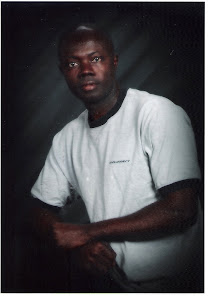BEYOND INSANITY
Tears Over My Motherland
Chapter 5
DUM, DUM, DUM, Zonn's face gave a sign of disappointment. The dum, dum ,dum were sounds of weapons being disacharged all around Monrovia. The fear of the rebels' presence in the city had deepened and the national army seemed confused. To allay their fears and to introduce some element of confidence, the soldiers had been shooting all over the place.
"But where are the rebels?" someone asked another, down Gurley Street.
"The BBC just reported that the rebels have encircled the city," the other said. "That has brought fears in the soldiers and as you can see they are all fired up."
"So by shooting all around here," the other replied, "then it means they are scaring away the rebels?"
"It may seem so."
"But have you seen the rebels?"
"Never," the other said, "but are all the Gio and Mano people not rebels?"
"No," his friend told him, "the BBC said most of the soldiers of the NPFL are Gios and Manos but that does not suggest that every rebel is a Mano or Gio."
"I agree."
" And who are the rebels say they are coming for?"
"The Krahn people."
"Are you sure," the other wondered, worry on his face,"reports from the BBC say the rebels are killing everybody they see over there ooh."
"Then we're in trouble."
The two companions might have had it right. The National Pariotic Front soldiers were coming for their enemies, and if that declaration was something to go by, then it meant that all the ethnic Krahns were marked to die. From the BBC reports, the rebels or the NPFL soldiers were masters in killing their enemies.
And the enemies, as the two buddies concluded with foreboding, included any Liberian who crossed their path. If a Liberian appeared good looking and healthy in body, then it meant he was one of those "eating" the government's money. There were instances in which ethnic Manos and Gios married to Krahns had been executed for defending their spouses.
Another ethnic group which was silently being destroyed, along with the Krahn were the Sarpos, who had close cultural similarities with the Krahns, and in fact many of the Sarpos apparently understood the other's language.
Now, it was a situation in which soccer followers would describe as 2-2 draw: the Gios and Manos on one side and the Krahns and the unfortunate Sapos on the other side. In between were the Mandingoes, who had, by accident of coincidence, been hauled into the fray.
Just before all hell broke loose, there had been the talk as to whether the Mandingoes were ethnic Liberians. From the King Sao Bosso Street in downtown Monrovia to historical monuments in Lofa County, there was no Liberian alive that would disagree that the Mandingoes were not ethnic Liberians.
And the president, Sam Doe, had reinforced this convinction that they were pure Liberians, like any other tribe. To show their appreciation for the president's triumphant declaration, many of the Mandingos trooped to join the national army to fight the government's enemies.
That singular action marked them out and the rebels added the Mandingos as enemy number three. So from here, the massacre from the national army was directed at the Gios and Manos, and from the rebels' side, their inhuman treatment was against the Krahns, Sarpos and Mandingos.
In between the slaughters, both the national army and the rebels carried out their violence against other tribes.
And the Kpellehs, whose central city had been converted to the rebels headquarters (Gbanga), were forced to work for the rebels. The Krus, considered forceful and ever ready to fight back, sadly, remained aloof in the war. Even when several of their leaders in New Kru Town, outside Monrovia, (Fred Blay, Roosevelt Savice, and Larry Borteh) were arrested, accused and summarily executed, the most war-like people of Liberia, did not move to organize themselves for the war.
The Bassas, like their Kru cousins found themselves under siege by the rebels, and Buchanan, one of the most exciting places in the nation remained under the control of the rebels; they too did not see it necessary to fight back. Of late, there were rumors of a Bassa Defense Froce, but it existed in name only.
The largest county, Lofa, which share border relations with Guinea decided otherwise after repeated assaults by the NPFL and then the newly formed ULIMO, and went ahead to organize the Lofa Defense Force.
Also subjugated were the Vais, the Deis and several other ethnic groups. As the dogs of war pursued each other and rendered Liberia ungorvenable, no Liberian was left unaffected. Even the so-called Americo Liberians and the Congos had their settlements besieged and ransacked.
It was a case of tears over the entire nation.
And as the cliche went, the enemies of war left no stone unturned in their mad rush to out do each other in the vicious killings that overshadowed Liberia.
The Daily Observer's Stanton Peabody, in one of his last editorials before the paper's offices were set ablaze, mourned: Bleed Poor Nation Bleed.
It was a fitting lamentation for a nation set ablaze by its own.
Yes, it was tears over my motherland.




